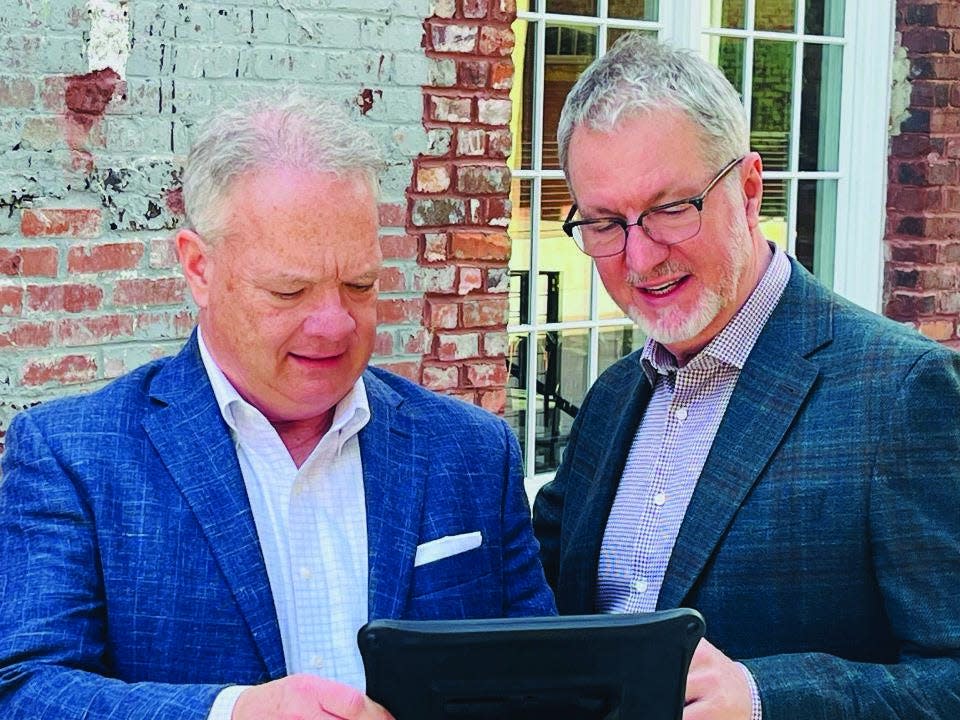Removing Barriers To Care - Greenville-Based Business Offers Primary Health Care, Urgent Care – Virtually
The baby wakes at midnight with a high fever. A friend moves to town and can’t find a physician. An employee shows up sick but doesn’t have a doctor – or insurance. A neighbor has chronic pain but refuses care because her insurance has a high deductible.

MD Care Group aims to help people with those problems and more.
“You go online and ask for a consultation, and we call you back at any time of the day or night. We provide personalized virtual care,” says Steve Koenemann, co-owner of MD Care Group. “It's almost like having a doctor in the family.”
When the company was founded by Chris Cole about 10 years ago, urgent care was the focus – 24/7, 365 days a year.
The concept was ahead of its time. When word got out, Cole received a call from someone at the S.C. Medical Association. “He told me that what I was doing was illegal. I said, ‘No. I'm legal.’”
That was years before COVID-19, the normalization of telemedicine, and the shortage of primary care physicians.
Of the 46 counties in South Carolina, 41 do not have enough health professionals; the state is projected to have a shortage of 3,230 physicians by 2030, according to Cicero Institute, a nonpartisan public policy organization.
“There is a great need for what we do,” Cole says. “We have solved tens of thousands of problems for people who need access to health care, prescriptions or medical knowledge.”
Clients are usually individuals who don’t have insurance, don’t want to use their insurance, can’t get an appointment with a physician, or don’t have time to see a physician. MD Care Group also works with employers to provide health care to employees.
Other companies, medical practices and hospitals now provide some kind of virtual care. “But we were at this long before people realized they could talk to the doctor on the phone while driving to CVS to get the prescription that the doctor just called in,” Koenemann says.
“People tell me, ‘I need to sit with a physician in person. And he needs to look me over.' It’s true. There's still a need for that. But many issues can be discussed over the phone or video with a primary care physician.”
MD Care Group continues to provide virtual urgent care for sick children and adults. But clients can also schedule a virtual appointment with a physician or begin a long-term, ongoing, virtual connection with a board-certified primary care physician.
A portal to request care is available on the company website, mdvirtualcare.com.
Clients can pay $99 for a one-time visit. A monthly subscription of $39 per month covers virtual health care visits and services for everyone in the household. Other plans are available. There are no co-pays. (Insurance does not cover the virtual services.)
The option for continuity of care with a primary care physician was essential, Cole says.
“Urgent care on the corner is primary care for many people,” he says. “But you lose all of that knowledge about your health because you don't see the same physician again and again. We pushed hard, really hard, to get our physicians to agree to be primary care physicians for our members. And that has worked out great.”
When people are sick, they want to see a doctor right away, Cole says. But a doctor at a brick-and-mortar practice might not be available for a week, or even two, he says.
MD Care Group can provide a virtual appointment with a primary care physician in 24 hours or less, Cole says.
Afterward, subscribers can request another consultation to ask questions, clarify information, or discuss the results of blood work or imaging, he says. “There's an ongoing communication.”
MD Care Group, based in Greenville, has board-certified physicians available in all 50 states.
Both Cole and Koenemann live in Greenville; neither is a health care professional. Cole has worked in real estate. A few years after he launched MD Care Group, he partnered with Koenemann – a former developer with technology skills.
The company offers more than primary care. Subscribers can get help navigating medical invoices from other entities or get pricing and information about services such as X-rays or colonoscopies.
A drug card is provided. “If a prescription is required, we send you the names of pharmacies, plus the cost of the drug, and assurance that the pharmacy will take the card,” Koenemann says.
MD Care Group also works with ARCpoint Labs, which has several locations in the Upstate.
ARCpoint began testing for COVID, strep throat and the flu, Cole says. “They wanted our physicians to read the lab results and prescribe medications if necessary. It was a natural fit,” he says.
The addition of dermatologists has been even more successful, he says.

“Anything about skin, hair, or nails ... our dermatologists can take a look and give you a treatment plan. If you need a prescription, we can provide that as well. I didn't realize the long wait times to see a dermatologist.”
MD Care Group provides two levels of mental health care. Therapists or counselors work with people who are dealing with conflict at home or work, mild anxiety or depression, or grief.
Psychologists and psychiatrists help people with more severe problems or who need medication.
“Regarding our mental health services, 78% of our members report feeling better after only three sessions,” Cole says.
"We're trying to remove the stigma. It's not a bad thing if you want to talk to somebody. It's a good thing. It's a wonderful, wonderful benefit that we provide."
And a big part of the business is serving employers.
“If you have a company ... whether it's 100 or 10,000 employees ... we can do a lot of things without involving insurance. You can use the service and satisfy the need, probably faster,” Koenemann says.
“It’s especially beneficial for businesses with part-time folks. We try to help employers save money on health care costs and provide care to employees who might not qualify for health insurance. We feel that it helps the employer and the employee.”
Whether they have insurance or not, people need help when they’re sick, Cole says.
“Our goal is to provide health care and access, whether a person makes $10 an hour or $500 an hour. We're removing barriers that keep people from getting the care they need.”
This article originally appeared on Greenville News: Removing Barriers To Care - Greenville-Based Business Offers Primary Health Care, Urgent Care – Virtually

